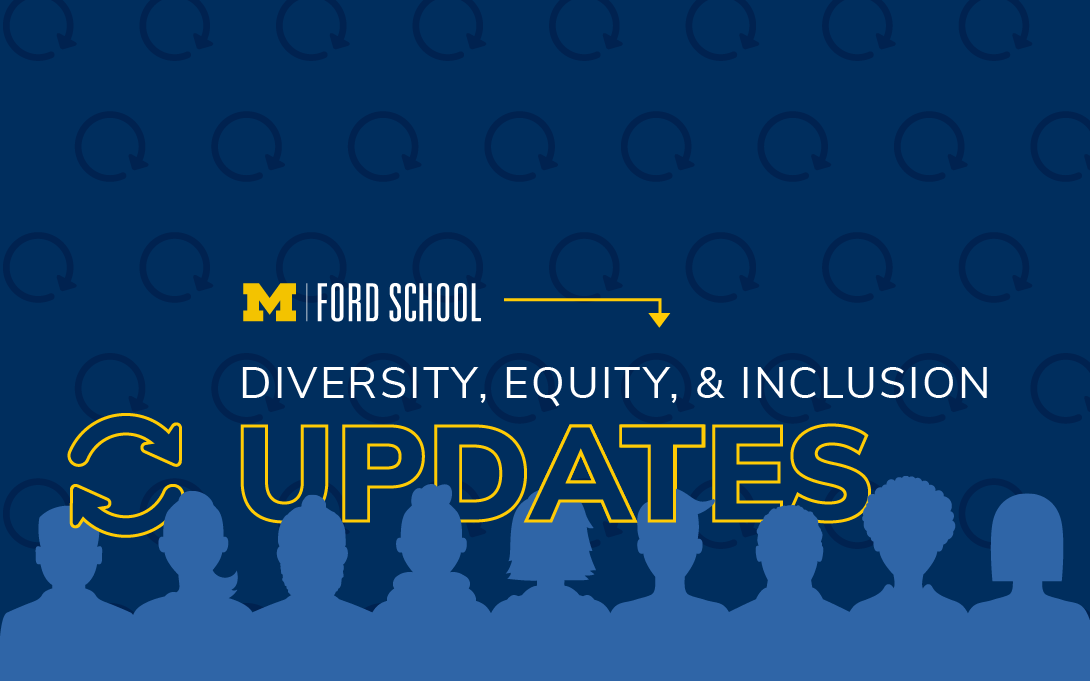
Updates regarding faculty, staff, and student DEI-related activity at the Ford School
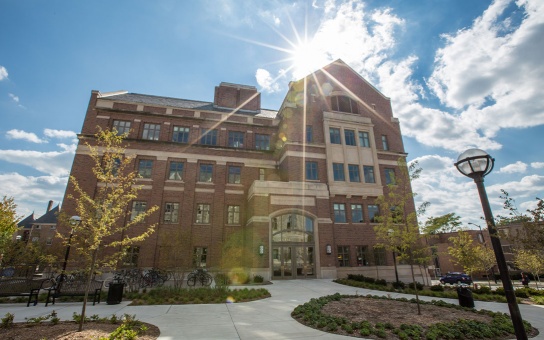
Diversifying who we are
The Undergraduate Students of Color in Public Policy (SCPP) hosted an undergraduate application preparation and panel discussion. This interactive session was designed to support prospective students who are traditionally underrepresented navigate the application process and provide perspective on what it's like to be a member of the Ford School community.
Diversifying what and how we teach
The Center for Racial Justice (CRJ) is pleased to announce the launch of its Racial Justice Reading Circles. Reading circles consist of three 2-hour meetings in which a small group of graduate students (MA, MPP, MPA and PhD students), postdocs, and faculty collectively explore a topic relevant to the study of race, (anti)racism, and racial justice. This semester, CRJ has two exciting opportunities: a reading circle on Racism, Health & Genetic Discrimination with Dr. Lynette Hammond Gerido, and a second reading circle on Policing with Dr. Nick Camp and Dr. Jeffrey Morenoff.
Promoting an equitable and inclusive climate
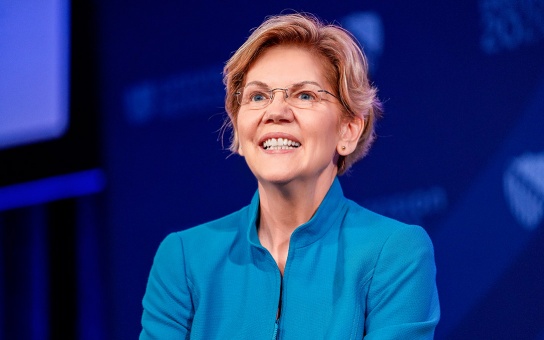
The Ford School hosted a conversation between Senator Elizabeth Warren and Ford School Dean Michael S. Barr, as they discussed Senator Warren's distinguished career as a public servant, perspectives on poverty and inequality in the United States, and her work to create a more just and equitable economic system. Ford School student leaders Crystal Olalde-Garcia (MPP ‘22) and Janani Gandhi (BA ‘22) joined the conversation This event was free and open to the public.
Education and community engagement are perhaps the most crucial keys to addressing the issues of systemic racism and social injustice within the world of public policy. Insight into Diversity captures how the Ford School addresses social inequities through increased dialogue and student engagement.
Graduate Career Services hosted a virtual information session with ACCESS (Arab Community Center for Economic and Social Services). The session was led by Federal Policy Manager Adam Beddawi, who provided an overview of ACCESS and spoke about internship partnerships and full-time opportunities for summer 2022.
During Black History Month, the Ford School and its research centers hosted a variety of events that examined a range of topics concerning the struggles for racial equity.
Are you part of a Ford School student organization and have a programming idea? Consider applying for DEI funding that is available to Ford School student organizations to support student-led programming. Submit proposals to Stephanie Sanders ([email protected]).
In February, the Ford School Professional Development Committee hosted Bentley Historical Archivists Aprille McKay and Caitlin Moriarty. This was an opportunity for Ford School staff to learn how to gather and submit materials to document Ford School and university history. As an added bonus, the archivists shared highlights of collections related to the history of Detroit.
Diversifying our research and policy engagement
Paula Lantz calls for acknowledgement of racial inequity in health care. Lantz has consistently denounced the movement against CRT, arguing that the scientific tenets that underlie CRT are crucial to understanding and addressing racial inequality in our health systems.
The University of Michigan is honoring faculty members Marisa C. Eisenberg and H. Luke Shaefer with presidential awards for public engagement, recognizing their contributions to significantly impact society and address the challenges communities face every day.
Black History Month, celebrated every February, highlights the experiences and honors the achievements of Black Americans throughout history. U-M’s Poverty Solutions highlights key data from its research that relates to Black Michiganders.
Patrick Cooney, assistant director of policy impact at Poverty Solutions, highlights the impact of the expired Child Tax Credit. With COVID-19 still affecting the economy and people's finances, experts have seen food hardship increase across the country recently, rising faster in households without children.
Education Policy Initiative faculty affiliate Deborah Rivas-Drake was named one of five a 2022 Anti-Racism Collaborative (ARC) Research and Community Impact Fellows by the National Center for Institutional Diversity.
Lead Stories, a fact-checking resource, featured Ann Chih Lin, associate professor of public policy, in a story that explored how many undocumented immigrants are in the United States and what government services those immigrants can access.
Upcoming events
Reciprocity, mutuality, and solidarity
March 7 | 11:00 - 12:30 pm ET
Aurora Santiago Ortiz
Drawing from her own experiences in research and teaching, Aurora Santiago Ortiz highlights the possibilities and potential pitfalls of community service learning and participatory action research. She offers practical lessons and insights for scholars, practitioners, researchers, and all those interested in engaging with communities in more horizontal, reciprocal, and solidary ways. Learn more about the event.
From rage to reconciliation: stories from the Israeli-Palestinian conflict
March 9 | 12:00 pm ET
Parents Circle-Families Forum (PCFF)
Two Parents Circle-Families Forum (PCFF) members—an Israeli and a Palestinian—will tell their personal stories of bereavement and explain their choice to engage in dialogue instead of revenge. Prior to this event, the Weiser Diplomacy Center will hold a community conversation open to any interested Ford School students. Registration is required for the warm-up session.
American Culture's alternative academic careers panel
March 9 | 4:00 - 5:30 pm ET
Panelists Whitney Peoples, Louise Beryl, Anthony Shenoda, and Joseph Stanhope Cialdella
Join panelists with similar PhDs who took different career tracks outside faculty positions. Registration is required.
Bringing the gig economy to healthcare
March 10 | 12:00 pm ET
Casey Pierce
The Center on Finance, Law & Policy’s “blue bag lunches” aim to foster interdisciplinary collaborations and showcase the work being done at the University of Michigan on issues related to finance, law, and policy. In this presentation, Professor Pierce will discuss how direct-to-consumer telemental health platforms create “gig” work arrangements for therapists working as independent contractors rather than full-time employees. RSVP required.
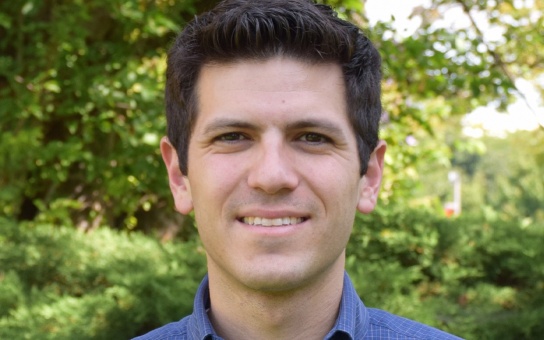
Environmental justice
March 10 | 12:00 - 12:50 pm ET
Joshua Basseches
The Ford School of Public Policy is proud to continue the Public Policy and Institutional Discrimination Discussion Series. The virtual series, open to students, faculty, and staff, is designed to foster dialogue on important issues of U.S. public policy.
This final session focuses on environmental justice and is facilitated by Joshua Basseches, Postdoctoral Research Fellow. Registration is required.
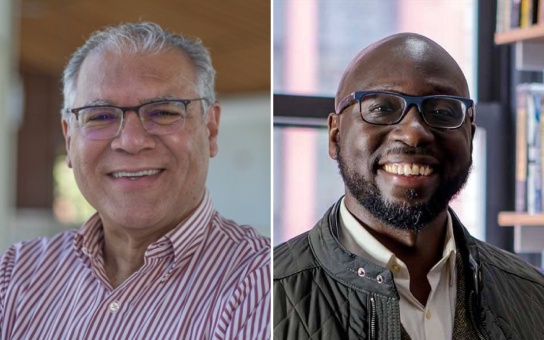
The impact of race on foreign policy formulation and governance interventions in Haiti
March 10 | 4:00 - 5:30 pm ET
Dr. Robert Fatton and Dr. Millery Polyné
This winter, the Center for Racial Justice is partnering with the International Policy Center and Weiser Diplomacy Center to host a series on race in international relations. The series will explore topics including America’s relationship with the colonial project, the role of race in the development of the International Relations discipline, and transnational advocacy and the global BLM movement. The conversation will focus in particular on Haiti, the world’s first independent Black republic and the site of numerous international interventions from the era of French colonial rule to the present. Registration is required.

Leading in a time of uncertainty: When should the president invoke DEI?
March 11 | 1:00 - 2:30 pm ET
Dr. Mildred García, Dr. Mary Dana Hinton, and Marvin Krislov
Using their experiences as leaders committed to diversity, equity, and inclusion (DEI), Dr. Carol Henderson will moderate a conversation between Dr. Mildred García, Dr. Mary Dana Hinton, and Marvin Krislov in which they led, managed, or thought through a controversial high profile campus crisis. They will share the difficulties, pressure, and scrutiny of being a DEI leader in difficult racial and political times. Webinar participants will learn how these leaders contended with their particularly difficult controversies and how they decided to “lead or leave.” Learn more about the event and registration.
"Nyumba" ASA 23rd annual culture show
March 11 | 7:00 - 10:00 pm ET
African Students Association
Enjoy an exhibition of cultures from all over Africa and celebrate the continent's diversity, beauty and influence on the rest of the world. Tickets are available.
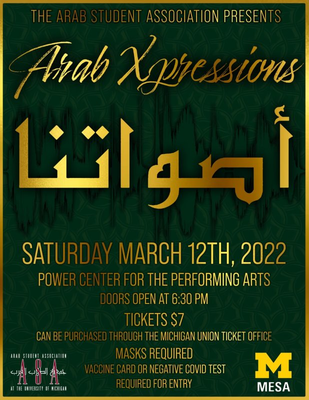
Arab Xpressions 2022
March 12 | 7:00 - 10:00 pm ET
Arab Student Association
Arab Xpressions 2022 will include dance performances put on by Arabesque, a dance troupe that performs the traditional Middle Eastern dance called dabke. Student talent performances will include spoken word, poetry, singing, and live music. Additionally, students will be performing skits, and the show will close with a live fashion show. Tickets are available.
Transnational advocacy and the BLM network
March 17 | 4:00 - 5:30 pm ET
Gay McDougall and Jamil Dakwar
This winter, the Center for Racial Justice is partnering with the International Policy Center and Weiser Diplomacy Center to host a series on race in international relations. The series will explore topics including America’s relationship with the colonial project, the role of race in the development of the International Relations discipline, and transnational advocacy and the global Black Lives Matter (BLM) movement. McDougall and Dakwar will share insights in dialogue with Ford School Professor John Ciorciari on the global BLM movement. Registration is required.
Pushing on policymaking theory
March 22 | 12:00 - 1:00 pm ET
Awilda Rodriguez, Charles H. F. Davis III, and KC Deane
Education Policy Initiative is proud to present a series of education policy talks given by esteemed researchers, policy makers, and/or practitioners. From threatening protestors to cutting diversity office funding on college campuses, one contemporary brand of policymaking has overtly sought to undermine social justice efforts in higher education. During this session, speakers will bring together existing theory, research, and contemporary policymaking examples to offer a framework of racialized policymaking that explicitly describes the lack of progress for racial equity in higher education. Registration is required.
Engaging religious audiences for social change
March 22 | 3:00 - 4:30 pm ET
Panelists Samira Mehta, Matthew Cressler, Eric Barreto, and Nancy Khalil
In this virtual event, Dr. Melissa Borja, a religion scholar and 2022 Anti-Racism Collaborative Research and Impact Fellow, leads a discussion with other religion scholars who draw on their research and scholarship to inform their involvement in anti-racist and social justice efforts in religious communities. Registration is required.
Democracy in Crisis
March 23 | 4:00 - 5:00 pm ET
Pulitzer Prize winning journalist and author Barton Gellman
Join us for Pulitzer Prize winning journalist and author Barton Gellman in conversation with Michigan Law Professor from Practice Barbara McQuade, as part of the spring 2022 Democracy in Crisis series. Registration is required.
Enhancing LGBTQ+ inclusive campus climate: A discussion of impactful practices
March 24 | 12:00 - 1:00 pm ET
Will Sherry (he/him/his), Director of Spectrum Center, U-M
In this session, the Center’s director, Will Sherry, will examine impactful practices at individual, community, and policy levels that can be taken by units and departments to enhance LGBTQ+ diversity, equity and inclusion. We will discuss these as well as common roadblocks to change and share resources to support actions that enhance LGBTQ+ inclusion and belonging. Registration is required.
15th annual Gramlich Showcase of Student Work
March 25 | 3:00 - 5:00 pm ET
Each spring, Ford School faculty and staff nominate dozens of outstanding student research and service projects for recognition at the Gramlich Showcase of Student Work. Established in 2008 to honor internationally renowned economist and former Ford School dean, Ned Gramlich, this event features exceptional student work on a broad range of local, national, and international policy challenges. Registration is required.
Looking ahead...
26th annual exhibition of art by Michigan prisoners
April 1 | 7:00 - 8:30 pm ET
Reuben Miller, Associate Professor at the University of Chicago
Over half a million people are released from prison each year. They join a staggering twenty million Americans who live with a felony record. They return to a new world, where over 44,000 laws and policies dictate where they may go, with whom they may live and how they spend their time. Join Professor Reuben Miller as he shares his work on Halfway Home: Race, Punishment and The Afterlife of Mass.
Democracy in Crisis: The twilight of democracy
April 4 | 4:00 - 5:30 pm ET
Anne Applebaum
Pulitzer Prize winning historian, journalist and commentator Anne Applebaum delivers the keynote lecture of the Spring 2022 Democracy in Crisis series, in conversation with Ford School Dean Michael S. Barr. Registration is required.
Masterclass in Activism: "Torn Apart"
April 5 | 12:00 - 1:00 pm ET
Dorothy Roberts
This Masterclass in Activism brings together in conversation Dorothy Roberts and Celeste Watkins-Hayes, director of the Center for Racial Justice. Through the Masterclass in Activism, the Center for Racial Justice hosts noted activists and thought leaders who have made significant marks on the policy landscape. Registration is required.

U-M DEI Mini-Conference
April 6 | 12:00 - 4:30 pm ET
Michigan Engineering Office of Student Affairs
Members of the UM community can engage in conversations about DEI issues on campus, the implementation of the 5-year DEI plan, and how to get involved to help in leading DEI efforts. The DEI mini-conference will involve student organizations hosting booths to talk about their DEI initiatives, speakers, and roundtable discussions of DEI issues on campus. The abstract submission deadline is 11:59 pm, Monday, March 14th. Got questions, comments, or concerns, contact [email protected].
Charles and Christella Moody lecture
April 7 | 2:00 pm ET
Lynn Perry Wooten, President, Simmons University
Please save the date for a lecture to honor Charles and Christella Moody.
Charles D. Moody was a faculty member in the School of Education and the first administrator to serve in the role of vice provost for university wide initiatives focused on diversity, equity and inclusion (Vice Provost for Minority Affairs).
Christella Moody worked in the Ann Arbor School District as a teacher, building administrator and Coordinator of Multicultural Education and Staff Development.
The Moody's were a powerful source in our community in encouraging, educating and caring for young people. The Moody's truly believed in this Nelson Mandela quote and lived to achieve it: "Education is the most powerful weapon which you can use to change the world."
Charles and Christella were pillars in both the Ann Arbor and University of Michigan community who deserve to be honored. Please join us.
Learning and development
March is Women’s History Month. Women’s History Month had its origins as a national celebration in 1981 when Congress passed Pub. L. 97-28 which authorized and requested the President to proclaim the week beginning March 7, 1982 as “Women’s History Week.” Throughout the next five years, Congress continued to pass joint resolutions designating a week in March as “Women’s History Week.” In 1987 after being petitioned by the National Women’s History Project, Congress passed Pub. L. 100-9 which designated the month of March 1987 as “Women’s History Month.” These proclamations celebrate the contributions women have made to the United States and recognize the specific achievements women have made over the course of American history in a variety of fields.
This month also includes International Women’s Day. March 8 is set aside as a global day to celebrate the social, economic, cultural and political achievements of women.